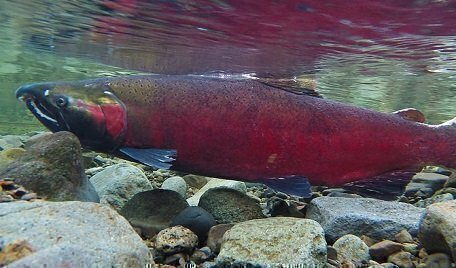When the full Supreme Court resumes arguments in mid-April, the Court will be short by one Justice when it considers a long-running dispute about salmon fishing, Indian treaty rights, and culverts in the state of Washington.
 On March 19, the Clerk of the Supreme Court clerk Scott Harris told the parties in State of Washington v. United States that a routine check missed Justice Anthony Kennedy’s participation in an earlier judicial decision from 1985, when Kennedy was on the federal circuit bench, related to the current case. After learning about the situation, the court said Justice Kennedy declined to contunue participatiing in the current case.
On March 19, the Clerk of the Supreme Court clerk Scott Harris told the parties in State of Washington v. United States that a routine check missed Justice Anthony Kennedy’s participation in an earlier judicial decision from 1985, when Kennedy was on the federal circuit bench, related to the current case. After learning about the situation, the court said Justice Kennedy declined to contunue participatiing in the current case.
With eight Justices on the bench for the April 18 arguments, Washington v. United States should get its fair share of attention. Cases involving fishing rights and fishing in general do come before the Court on a regular basis. In 2015, a divided Court said in Yates v. United States that a commercial fisherman who discarded undersized red groupers didn’t violate the Sarbanes-Oxley Act. (Justice Elena Kagan’s use of Dr. Seuss metaphors in her dissent was widely reported.)
Significant past Supreme Court decisions about tribal fishing rights include United States v. Winans (1905), when the Court said fishing rights were “not much less necessary to the existence of the Indians than the atmosphere they breathed” and three cases involving the Puyallup tribe.
In the current salmon-fishing case, Washington state attorney general Bob Ferguson is asking the Court to reconsider a Ninth Circuit decision that requires his state to replace culverts that he said could cost “billions of dollars.” Ferguson believes that the salmon-passage requirements exceeded the intent of a series of treaties from the 1850s made with northwest Indian tribes.
The case has been in the legal system since September 2001, when the federal government and several tribes sued Washington state. They claimed the existing culvert system kept the tribes from catching enough fish to make “a moderate living.” The Ninth Circuit Appeals Court said the state had to redo its culvert system under its roads to allow for the safe migration of salmon.
Ferguson is also arguing that a bigger issue involving regulatory power is at stake. “’[P]laintiffs could use the panel’s decision to demand the removal of dams and attack a host of other practices,’ and these concerns extend far beyond the State of Washington, because the same treaty language is found in treaties with tribes in Idaho, Montana, and Oregon,” Ferguson said in his appeal to the Court, which was accepted back in January.
The Suquamish Indians as tribal respondents side with the Justice Department. “The Treaties secure the right of taking fish, at all usual and accustomed grounds. Washington’s barrier culverts undermine that right by preventing the fish from getting to their spawning grounds—and to the Tribes’ fishing grounds,” they told the Court.
The Justice Department also contends Washington state overstated its estimate for replacing the culverts at $2.3 billion; that the state’s salmon supply was noticeably reduced by the culvert system; and that the state violated its Indian treaties.
But in another reply to the Court, Washington state blames the federal government for the salmon problem. “The injunction ignores the stark inequity of the federal government using a treaty it signed to force the State (a nonparty) to bear the entire cost of replacing culverts that the federal government designed and permitted,” Ferguson says. It also believed there was no evidence that some culverts have affected tribal salmon harvest.
Scott Bomboy is the editor in chief of the National Constitution Center.







